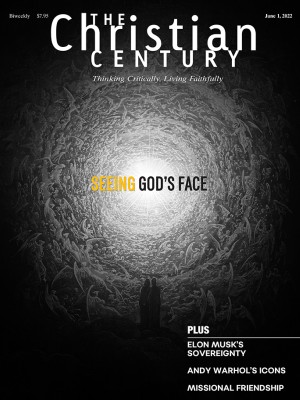The most important American Old Testament scholar of the last century is Norman Gottwald
In the life of early Israel, Gottwald found a God of economic justice.

Norman Gottwald died in March at age 95. He is, in my judgment, the most important and influential Old Testament scholar of the 20th century in the United States.
The only other near candidate for that is Brevard Childs, who died in 2007. In 1979, both scholars published discipline-redefining works: Gottwald’s The Tribes of Yahweh: A Sociology of the Religion of Liberated Israel, 1250–1050 BCE and Childs’s Introduction to the Old Testament as Scripture. In very different ways, both were moving beyond the conventional historical social criticism that had dominated study in the modern era. It was characteristic of Gottwald’s generous, irenic way that he published an article in the October 1985 issue of Theology Today showing how his work and that of Childs could be held together in a useful, critical way.
The Tribes of Yahweh is of durable significance because it reads the Old Testament with reference to the interpretive categories of the social sciences, notably the function of economics. Specifically, it focuses on the book of Judges and the tribal configuration in Israel before the emergence of the monarchy. Gottwald reviews and rejects the notion that there was a violent conquest of the land by the invasive, intrusive Israelites from Egypt. In like manner, he reviews and rejects the German hypothesis that the land was settled by immigrants.
Read our latest issue or browse back issues.
Instead, he champions the thesis that the conflict narrated in Judges was the result of a peasant revolt whereby the subsistence farmers in Canaan violently revolted against the Canaanite city-kings and aggressive landowners who acted in predatory, exploitative ways toward the vulnerable peasants. That is, he proposes that the narrative reflects something of a class conflict.
To fund the imagination, courage, and energy of such a peasant movement, Gottwald proposes that the Pentateuchal traditions may be understood, in sum and substance, as the ideology that was celebrated in cultic context. This regular public reiteration of the narratives provided coherence and justification for the revolt. Alongside this hypothesis, Gottwald questions the role of YHWH, the God featured in these ideological narratives of the Pentateuch.
Gottwald proceeds carefully to distinguish his approach—which he calls structural functionalism—from the typical religious idealism that regards YHWH as an independent agent distinct from social reality. He concludes that “the loosely federated egalitarian tribalism of Israel [which] was symbolized and institutionalized at the most comprehensive level by a common cultic-ideological allegiance to mono-Yahwism” is a function of sociopolitical equality. “Far from being an eccentric, cultic compartment of Israel’s life or an arbitrary ornament on the main body of society,” he writes, mono-Yahwism was “an axial, form-giving, and energy-releasing reality” in various areas across the people’s common life.
It follows immediately for Gottwald that the reverse proposition is also true: “Sociopolitical egalitarianism was a function of mono-Yahwism.” In these reciprocal formulations, YHWH and social egalitarianism are intimately and exclusively held together. Belief in YHWH, as
the motivator and sanctioner of the social system, together with his cult’s minimal demands on the resources and on political power, met the two potentially contradictory communal needs for cultural identity and unified self-defense against rival systems, on the one hand, and for egalitarianism and self-rule, on the other hand.
Thus in the confessional life of early Israel, YHWH is inescapably and integrally linked to economic fairness.
It is impossible to overstate the importance of this daring claim at the heart of Gottwald’s study. His two-way articulation of “function” means that Israel cannot have YHWH without the social vision and practice of neighborly covenantalism, nor could it have such a social vision and practice except as linked to YHWH.
It may be readily inferred from Gottwald that the counterpoint is also true: Canaan could not have its predatory city-king economic system without Baal, and Baal could not be embraced without the embrace of a predatory economy—for Baal is, in the horizon of Israel, the great lord and legitimator of economic predation.
This linkage is evident if we consider the dramatic contest of gods at Mt. Carmel between YHWH and Baal (1 Kings 18) alongside the dispute about land in the narrative of Naboth’s vineyard (1 Kings 21). Ahab and Jezebel, as followers of and advocates for Baal, feel legitimate in seizing peasant land, even as Elijah, an advocate for YHWH, speaks a harsh word on behalf of the peasant interest of Naboth. This linkage is a defining one for Gottwald and can be frequently observed in both the Old and New Testaments. A key distortion of biblical faith, in Gottwald’s frame of reference, is the widespread, endlessly recurring attempt to have the God of the Bible without the socioeconomic practice that goes with that God. When that linkage is not deliberately maintained, both the God of Israel (who is the God of the gospel) and the socioeconomic practice of the community are sure to be distorted.
It is illuminating to take into account Gottwald’s cultural context. He worked amid an emerging liberation theology informed by Marxian categories of analysis. More specifically, he lived and worked in the Bay Area as a faculty member of the Graduate Theological Union in the wake of the Vietnam War. The free speech movement in the university pitted protesting students against an unresponsive administration that was supported in its intransigence by the ideological fervor of California governor Ronald Reagan and his board of regents. The conflict—between gods and between social systems—that Gottwald discerned in the biblical tradition was being reperformed before his very eyes.
Lest we judge that Gottwald’s hypothesis of a peasant revolt was too personal and subjective, we may notice that it has been observed that the German hypothesis of immigration nicely echoes the Bismarckian formation of the German state, just as the American model of conquest reflects the European colonization of the American continent. No interpretation is ever innocent about such matters, and Gottwald surely was not.
Gottwald has refined The Tribes of Yahweh over time, and this has included the correction of overstatements and the elimination of material that proved distracting. On the main point, however, Gottwald’s original text decisively changed the discipline with his erudite insistence that Israel’s faith in YHWH cannot and must not be separated from the socioeconomic political realities that the ancient people of Israel faced. Once one inhales the main gains of Gottwald’s scholarship, one begins to see throughout scripture the linkage between the character and resolve of God and the mandate of sociopolitical equality as a function of Yahwism. The covenantal vision of a neighborly economy, so clearly and often voiced in the Torah, requires advocacy for both polity and practice that are pro-neighbor, anti-predation, and anti-accumulation.
Gottwald’s tenacious, lifelong work was permeated with great moral passion. He extended this passion to the protesting students in Berkeley and to many other situations of injustice. He was a formidable voice in advocacy for feminism, and he fought for the rights of Native people in the United States.
I’m convinced that no leader of a Jewish or Christian community of faith can afford to disregard Gottwald’s interpretive work. The Christian movement has been so domesticated by the force of empire that much of its testimony simply echoes and reiterates dominant socioeconomic practice. As the church has settled for such domestication, it has become a champion of the kind of charity that remains safely inside the assumptions of confiscatory economics. Such anemic practice provides neither energy nor courage for engagement in a neighborly economy, which requires both radical critique of our systemic economic arrangements and emancipated imagination about an alternative practice.
As our society grows more frightened and more repressive, the church is faced with an urgent call for truth telling—concerning both the exposure of our predatory economic system, which produces and sustains poverty through cheap labor, and the articulation of an alternative way that will yield neighborly abundance. But as long as the church is in unthinking collusion with dominant economic assumptions, this hard and transformative truth is unlikely to be spoken aloud.
“How are they to believe in one of whom they have never heard?” asks Paul. “And how are they to hear without someone to proclaim him? And how are they to proclaim him unless they are sent? As it is written, ‘How beautiful are the feet of those who bring good news!’” (Rom. 10:14–15). Gottwald’s breathtaking book and his long refinement of it attest to the life of one who understood that this is a time for beautiful feet.





